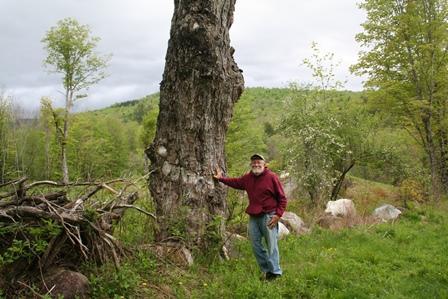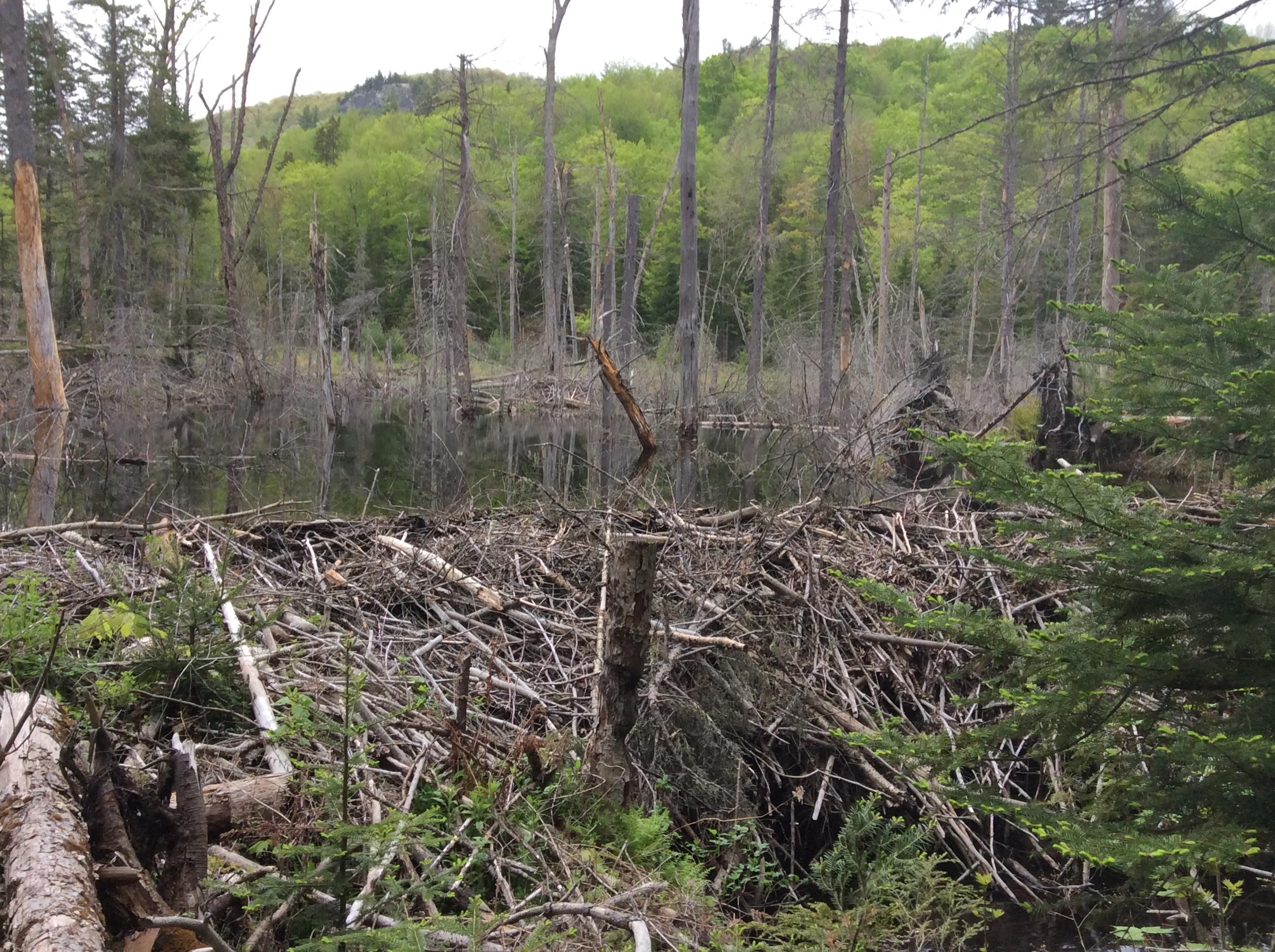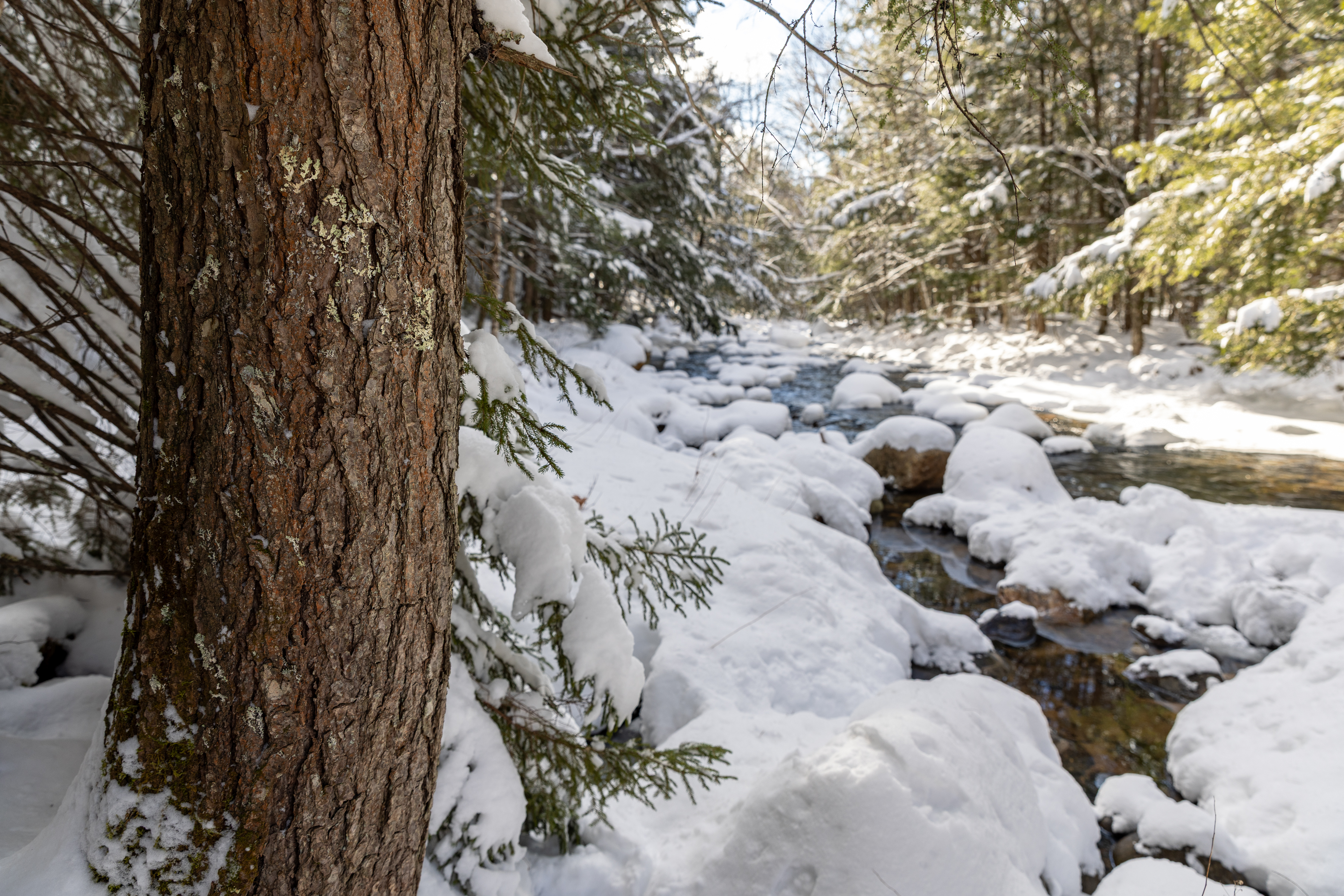Landowner Conserves Habitat-Enhanced Land in Groton
- Tags:
- Land Conservation

Jim Cross stands near the giant maple that he and his siblings swung from as kids. It still stands sentinel over the pastures and forests of the newly conserved land.
After a bumpy drive up a dirt road toward the headwaters of the Cockermouth River in Groton, Jim Cross parked his truck near a beaver dam and started walking toward one of four pastures -- all that remains of the abandoned farm purchased by his family in the early 1950s. Five-inch hoof prints in the mud revealed that a moose had taken the same route not long before.
“We’re very likely to see a moose step out here anytime,” Cross said, stepping over moose scat near saplings and shrubs with nipped- off ends higher than a deer would reach. Bear droppings were even more abundant, but the animals themselves stayed out of sight except for the birds, whose chirps and melodies filled the air.
Cross has been working with foresters and the Natural Resources Conservation Service over the past 35 years to manage his 72-acre property primarily for wildlife habitat. The results of that collaboration complement the already rich biodiversity of the headwaters area.

The old pastures, mowed regularly, are each bounded by stone walls or free flowing streams, buffered by brushy, uncut borders. Apple trees grow in three of the pastures, offering fruit that Cross refers to as nothing less than life changing.
“They’re so sour that one bite will change your whole life forever,” he said.
Since the early 1980s, a series of small patch cuts have been carried out in the forested part of the property. These canopy openings encourage diversity in the plant community, providing the saplings and shrubby thickets of a regenerating forest required by species like ruffed grouse and woodcock.
A large beaver dam across the main stem of the Cockermouth River has created a forest of standing dead trees providing nesting sites for birds. Blue herons have recently moved in, perhaps attracted by the growing population of native brook trout behind the dam. Below the dam, two unnamed streams join the Cockermouth on the property as it flows down toward the Sculptured Rocks Natural Area and into Newfound Lake.
The obvious value this land has for wildlife is one of the reasons Cross decided to protect the land by donating a conservation easement on it to the Forest Society. Support for that decision, according to Cross, also came from a Family Mission Statement that he and his wife Sharon have posted just above the handle of the refrigerator in their kitchen.
“We put it there because it’s a place we both visit many time a day. Seeing it so often keeps our core values fresh in our minds. One of those values is treating the environment with reverence,” Cross said.
Cross’s parents, James and Dorothy Cross, bought the Groton property in 1950 when they lived in Melrose, Mass., and James Sr. worked at MIT. To them, it was the perfect wild place to give their kids (Jim is the oldest of six) a place to play in the great outdoors. They propped up the old farmhouse then on the property and spent weekends and summer vacations there. This continued after the family moved to Pennsylvania, though the trips were necessarily less frequent. They fished in the river, hurled themselves down the hills on makeshift toboggans and sailed across the sky on a swing in the huge maple tree that still stands sentinel over the highest pasture.
Cross returned to New Hampshire from Pennsylvania as soon as he was old enough to drive, “springing back like a rubber band”, he said. He lived in Groton for a time, serving as a selectman and helping to write the town’s first master plan. His work in business consulting for Fortune 500 companies took him to far-flung parts of both North and South America. Now “mostly retired,”, he and Sharon live in Moultonborough, but the Groton land holds a special place in the family’s heart.
“My siblings are all completely on board with the conservation easement,” Cross said. “Even though they’re spread out from Germany to California, this place is special to all of them.”
The old farmhouse is gone now, but the family still uses the land for annual get-togethers and camp-outs.
During a recent visit to see the wildlife habitat enhancements, Cross stopped at a rounded
bedrock outcropping near the site of the old farmhouse. The view from the top of the outcropping included the four cleared pastures, the streams, and part of the wetlands behind the beaver dam.
“We call this the Big Rock” Cross said. “We all spent a good part of our childhoods playing up here. Ask any one of my sisters and brother, and they will tell you that this is the geographic center of our family.”
That center is protected into perpetuity, thanks to Cross’s generous donation of a conservation easement.
